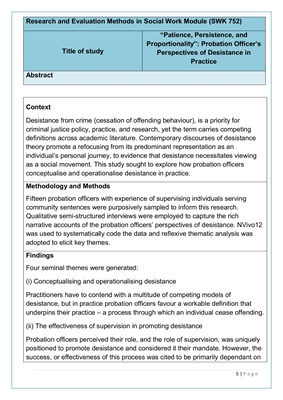
5 | P a g e
Research and Evaluation Methods in Social Work Module (SWK 752)
Title of study
"Patience, Persistence, and
Proportionality": Probation Officer's
Perspectives of Desistance in
Practice
Abstract
Context
Desistance from crime (cessation of offending behaviour), is a priority for
criminal justice policy, practice, and research, yet the term carries competing
definitions across academic literature. Contemporary discourses of desistance
theory promote a refocusing from its predominant representation as an
individual's personal journey, to evidence that desistance necessitates viewing
as a social movement. This study sought to explore how probation officers
conceptualise and operationalise desistance in practice.
Methodology and Methods
Fifteen probation officers with experience of supervising individuals serving
community sentences were purposively sampled to inform this research.
Qualitative semi-structured interviews were employed to capture the rich
narrative accounts of the probation officers' perspectives of desistance. NVivo12
was used to systematically code the data and reflexive thematic analysis was
adopted to elicit key themes.
Findings
Four seminal themes were generated:
(i) Conceptualising and operationalising desistance
Practitioners have to contend with a multitude of competing models of
desistance, but in practice probation officers favour a workable definition that
underpins their practice - a process through which an individual cease offending.
(ii) The effectiveness of supervision in promoting desistance
Probation officers perceived their role, and the role of supervision, was uniquely
positioned to promote desistance and considered it their mandate. However, the
success, or effectiveness of this process was cited to be primarily dependant on